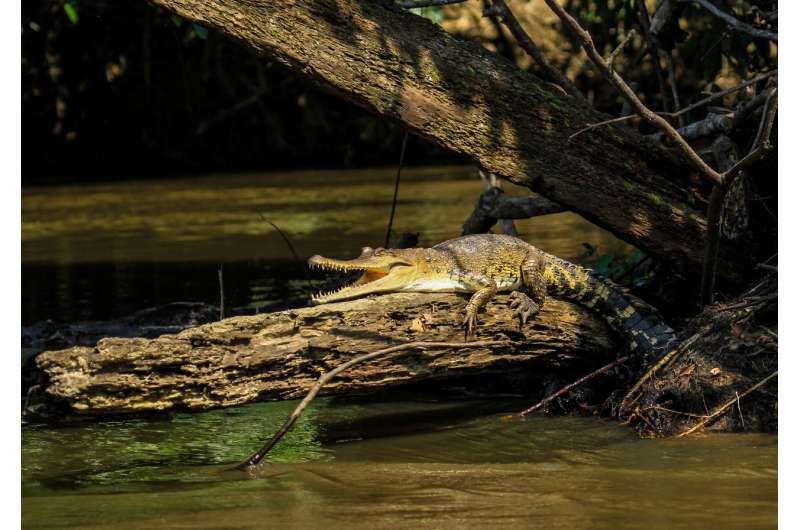Discovered: New species of African crocodile

While studying the critically endangered slender-snouted crocodile, researchers made a startling discovery—what they thought was one species is actually two. The discovery raises concerns about whether current conservation practices are enough to protect them.
The slender-snouted crocodile is medium-sized, lives in freshwater habitats, and, as its name suggests, has a long and slender snout. When scientists analyzed the DNA and physical characteristics of crocodiles in the wild and in captivity in six African countries, they found two distinct species of slender-snouted crocodiles—one unique to West Africa and one unique to Central Africa. The Central African slender-snouted crocodile is the first new living crocodile species to be defined and named in nearly 85 years.
"Recognizing the slender-snouted crocodile as actually comprised of two different species is cause for great conservation concern," said Matthew Shirley, a crocodile expert at Florida International University's Tropical Conservation Institute and lead researcher of the team that made the discovery. "We estimate only 10 percent of slender-snouted crocodiles occur in West Africa, effectively diminishing its population by 90 percent. This makes the West African slender-snouted crocodile one of the most critically endangered crocodile species in the world."
The International Union for Conservation of Nature (IUCN) listed slender-snouted crocodiles as "Critically Endangered" in 2014. They are threatened by habitat loss, hunting and overfishing – which diminishes their food supply and leads them to drown in nets. At first glance, the West African and Central African slender-snouted crocodiles appear quite similar. In addition to the differences in their DNA, the scientists found differences in the skull shape and scales that strongly support the existence of two species.
Slender-snouted crocodiles are understudied and underrepresented in conservation programs. First described in 1824, they live in very remote areas and have little interaction with people. They camouflage themselves from prey and seek refuge from potential predators in highly vegetated bodies of water. They're also incredibly shy. Finding crocodiles to examine and collect DNA samples from in the wild has long been a challenge.
Shirley's latest finding will have major implications for understanding crocodile evolution and diversity, as well as conservation. Conservation policies require the accurate naming of species and assessment of population numbers. The future of the West African slender-snouted crocodile will likely depend on the success of captive breeding and reintroduction programs, according to the researchers.
"We hope that this better understanding of slender-snouted crocodile evolution and taxonomy draws much-needed attention to the plight of this species, which has long been recognized as the least known crocodilian in the world," says Shirley.
The researchers published their findings in Zootaxa. The team also includes researchers from the University of Florida and the University of Iowa.
This is not the first time researchers have discovered cryptic crocodile species hiding in plain sight. Until recently, only three crocodile species were recognized in Africa – the dwarf, Nile and slender-snouted crocodiles. Research combining the analysis of DNA and outward appearance revealed the existence of two Nile species and three dwarf species—discoveries also lead or supported by Shirley and others.
"We knew from the dwarf and Nile crocodiles that something was going on, so we decided to see if something similar was happening with the slender-snouted crocodiles," Shirley said. "My objective wasn't to describe a new species. We set out to examine the evidence and better understand these elusive crocodiles."
More information: MATTHEW H. SHIRLEY et al. Systematic revision of the living African Slender-snouted Crocodiles (Mecistops Gray, 1844), Zootaxa (2018). DOI: 10.11646/zootaxa.4504.2.1
Journal information: Zootaxa
Provided by Florida International University





















